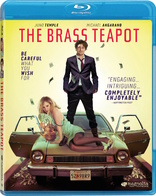The Brass Teapot Blu-ray Movie
HomeThe Brass Teapot Blu-ray Movie 
Magnolia Pictures | 2012 | 101 min | Rated R | Jun 18, 2013Movie rating
6.6 | / 10 |
Blu-ray rating
| Users | 4.0 | |
| Reviewer | 4.0 | |
| Overall | 4.0 |
Overview
The Brass Teapot (2012)
When a couple discovers that a brass teapot makes them money whenever they hurt themselves, they must come to terms with how far they are willing to go.
Starring: Michael Angarano, Juno Temple, Alexis Bledel, Billy Magnussen, Alia ShawkatDirector: Ramaa Mosley
| Dark humor | Uncertain |
| Thriller | Uncertain |
| Comedy | Uncertain |
| Fantasy | Uncertain |
Specifications
Video
Video codec: MPEG-4 AVC
Video resolution: 1080p
Aspect ratio: 2.35:1
Original aspect ratio: 2.39:1
Audio
English: DTS-HD Master Audio 5.1 (48kHz, 24-bit)
Subtitles
English SDH, Spanish
Discs
50GB Blu-ray Disc
Single disc (1 BD)
BD-Live
Playback
Region A (C untested)
Review
Rating summary
| Movie | 4.0 | |
| Video | 4.5 | |
| Audio | 4.0 | |
| Extras | 3.5 | |
| Overall | 4.0 |
The Brass Teapot Blu-ray Movie Review
All That Glitters
Reviewed by Michael Reuben July 21, 2013The Brass Teapot is a modern fairy tale with a sense of humor that is by turns sweetly innocent and deeply disturbed. I doubt that it will ever command a wide audience, but for those who inhabit its satiric sweet spot, it's a rare gem with a winning cast and a unique sensibility. At the end of this review, I'm not going to make a recommendation either way, because humor is subjective. Humor about the things people will do for money may be an even more treacherous topic, especially today. Writer/director Ramaa Mosley learned her craft on music videos and shorts. Searching for an idea for her first feature, she found Tim Macy's short story, "The Brass Teapot". Her initial idea was to work with Macy and an artist on a graphic novel, but as they proceeded she realized that the story could also work as a film. She and Macy outlined the story, and Macy provided the screenplay. Because The Brass Teapot was eventually picked up by Magnolia Pictures, it has been seen mostly via video-on-demand, with only a few theatrical screenings. The limited critical reaction was generally negative, but what was most interesting was how equal condemnation came from opposite directions. Some thought the film was too dark for a comedy. Others thought it was too light-hearted for a post-2008 story about greed and conspicuous consumption. Personally, I prefer my fairy tales the way Goldilocks liked her porridge: not too dark, not too light, but just right.
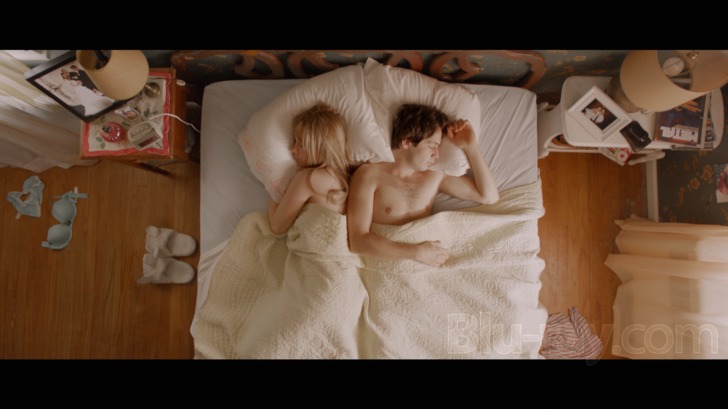
Alice and John (Juno Temple and Michael Angarano, with marvelous chemistry) are a young married couple struggling to get by in the small town of Laurel Springs, Indiana. Alice was the prom queen in high school and voted "most likely to succeed", but she married for love—unlike her former friend and now rival, Payton (Alexis Bledel), who came from money, works for her father and married a useless pretty boy named Arnie (Billy Magnussen). John spends long, boring hours in a telemarketer's cubicle so that Alice can finish her degree in art history, which she's now finding is useless in the job market of the Great Recession. The future looks bleak from the front seat of their battered Pinto (yes, a Pinto). Then fate intervenes. A freak traffic accident on a country road puts Alice and John within view of a remote antique shop run by an elderly Jewish woman (Rebecca Darke). While John reports to a policeman, Alice sights a fantastic object that draw her towards the shop with all the mystical power of Gollum's "precious". (Explicit Lord of the Rings references abound throughout The Brass Teapot.) Without John even realizing it, Alice slips into the shop and filches what's drawn her eye: a gleaming and elaborately detailed teapot of handworked brass. The teapot (which, as they will later discover, dates back to the time of Christ) produces money, but not just on command. It only responds to pain, and for a good stretch of the film, The Brass Teapot becomes a slapstick comedy, as Alice and John take turns injuring themselves while their prize antique spews forth bills in large denominations. A Brazilian wax, dental work without anesthesia, S&M in the bedroom—it's all in a day's work for the newly empowered couple. As their lifestyle improves, they trade up from their long-time similarly situated friends, Louise and Chuck (Alia Shawkat and Bobby Moynihan, who is much better here than in any SNL sketch), for the company of the high-living Payton and Arnie. It's expensive company, since John now delights in picking up $1000 dinner checks. The couple tells Alice's suspicious mother (a hilariously cranky Debra Monk) and her vegan New-Age sister and brother-in-law (Lucy Walters and 30 Rock's Jack McBrayer) that they've taken up "investing". But clouds quickly form on the horizon. John makes the mistake of appearing on the PBS program Antiques Roadshow to see what he can learn about the teapot, without considering who might be watching. As a result, the Hasidic sons of the elderly antique dealer come calling, armed and dangerous. Oddly enough, though, they don't seem to care when John claims (falsely) that he sold the teapot; they just want the money. Another arrival is a Chinese scholar whose card identifies him as Dr. Ling, head of The Theosophist Society (Stephen Park, who is actually Korean-American but who mastered a thick Chinese accent that is just this side of intelligible). With daft solemnity, Dr. Ling pops up at regular intervals, warning John that the teapot is evil, has corrupted every person who owned it, and will draw out every ounce of evil within him and Alice. None of the previous owners, who include Hitler and Genghis Khan, had the strength to part with it. But if John and Alice willingly surrender it to Dr. Ling, he can secure it beyond the reach of human temptation. This is his life's quest, as it was his father's and grandfather's before him. (Yeah, right! is Alice's reaction.) The worst is yet to come. Like an old-fashioned drug dealer, the teapot raises the price once its owner is hooked. Soon, self-inflicted physical pain no longer generates enough of a "return" to support the couple's new lifestyle. That's when Alice stumbles upon emotional torment, which the teapot really seems to like, and she insists that the couple start hurting each other in the deeply personal way that only married people know how to do. The scenes where Alice and John confess to each other the kinds of things that most marriages could not survive would be funnier if Temple and Angarano weren't so believable as a young couple in love. They make the pain of these disclosures convincing enough that you can feel the beginning of the downward slide. The decline accelerates as Alice and John discover that the teapot also thrives on the pain of others. Soon they're taking front row seats at wrestling and martial arts tournaments, lurking in hospital corridors (director Mosley has a cameo as an agonized mother giving birth), and exposing their friends' and neighbors' painful secrets with a smile, just to get a payoff from the teapot. It's only a matter of time before Alice has them digging a grave so that they can kill someone, which, Alice figures, should really be a big score. Alice does eventually pull herself back from the brink, and the occasion of her wake-up call is a surprise, even to her. By that point, though, forces have been set in motion that can't be stopped. For all those who consider The Brass Teapot too light a film, I will simply note that the story's resolution requires substantial bloodshed and several dead bodies. The Brothers Grimm often did a fair amount of killing before pronouncing happily ever after, and why not? Someone has to pay the piper.
The Brass Teapot Blu-ray Movie, Video Quality 
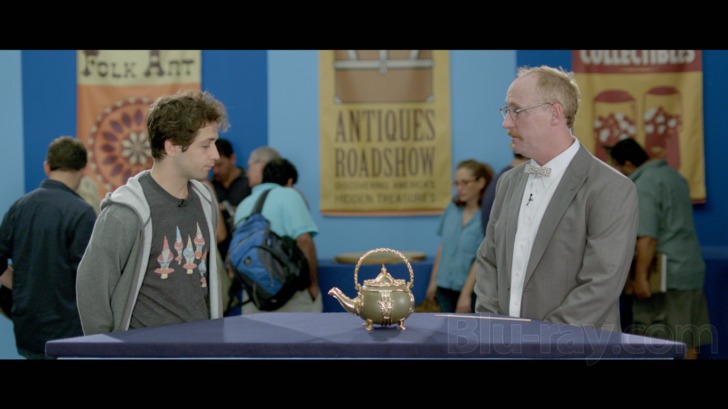
Definitive information about the shooting format for The Brass Teapot was not available, but the delicate hues of cinematographer Peter Simonite's subtly surreal photography were finalized on a digital intermediate, from which Magnolia Home Video's 1080p, AVC-encoded Blu-ray appears to have been sourced. Simonite, an experienced camera operator and second unit DP, has lit much of the film as if he were photographing a commercial or a catalog, establishing from the outset that Alice and John are ready-made consumers just waiting for the means to furnish their lives with every available luxury good. (Their credit cards are already maxed out.) Even their darkest deeds are committed in bright places surrounded by cheerful hues. Areas of solid black are rare, but when they occur, the blacks are true and well-rendered. Detail is impressive throughout, whether it's the dented and poorly repaired body of the ancient Pinto that Alice and John own at the outset or the increasingly eye-catching array of vehicles and goods they acquire as their fortunes rise. The makeup reflecting their various injuries along the way is also convincing without being revolting. (In real life, they'd look a lot worse.) Especially with the teapot's frequent sprays of currency and other actions sequences, the healthy bitrate of 31.99 Mbps is a welcome aid to avoiding motion artifacts. Magnolia's commitment to visual quality has not abated.
The Brass Teapot Blu-ray Movie, Audio Quality 
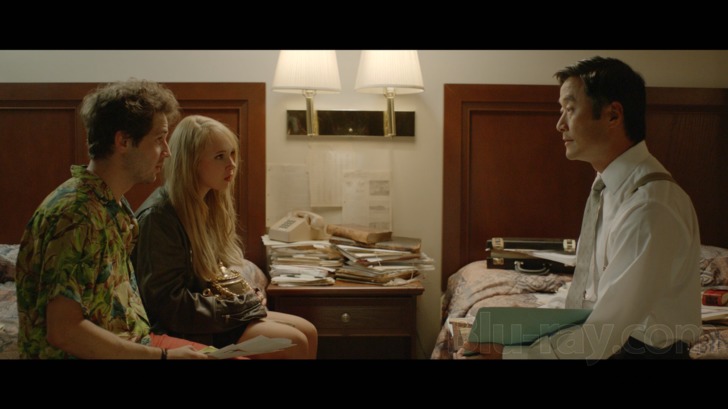
The most important sound effects on The Brass Teapot's lossless DTS-HD MA 5.1 track—they're the effects that director Mosley discusses at length in her commentary—are those of the teapot itself. As a semi-animate object, it vibrates, reacts to human touch and make a variety of sounds when it produces money, sometimes a quiet tinkle, and sometimes a great whoosh of bills shooting out. (Nearly all of these visual effects were practical.) The Blu-ray's soundtrack neatly differentiates among the teapots various "speeches", which is no small trick when you consider that they're usually layered in with shrieks, yelps and other cries of pain (not to mention the physical sounds of mayhem). Otherwise, The Brass Teapot has a generally front-oriented mix, with the surrounds providing a general sense of ambiance and support for the musical track, which is composed of underscoring by Andrew Hewitt (Submarine) and a quirky selection of songs ranging from a cover of "I Fought the Law" by the Strummers to Beck's Timebomb, several songs by the Amoeba People (including "Demon Lover") and several by Lindsay Jones. Though not demo material, the track is effective for the film.
The Brass Teapot Blu-ray Movie, Special Features and Extras 
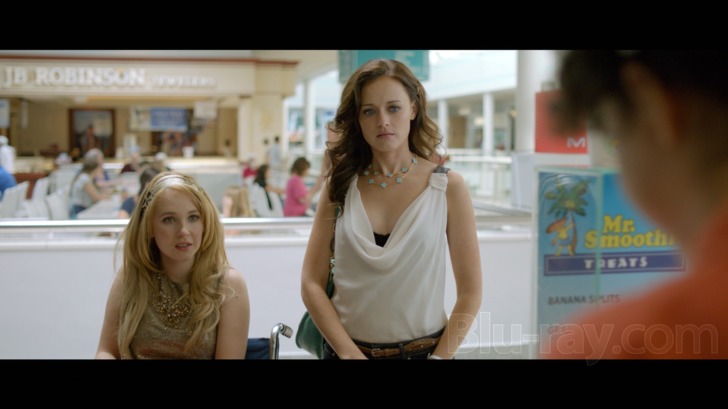
- Commentary with Director Ramaa Mosley and Executive Producer P. Jennifer Dana: Mosley dominates the commentary (indeed, she is alone for about the first half hour), which is an informal and chatty affair. She goes into greater detail than in her interview (listed below) about the origin of the script and the teapot mythology, which was entirely invented by Mosley and screenwriter Tim Macy. She describes the inventive ways she and her crew saved money, including getting permission from Toll Brothers to use one of their "spec" houses as the mansion that Alice and John acquire, and she points out various improvs by Angarano and Moynihan.
- Prologue/Alternate Opening (1080p; 1.78:1; 3:09): This was obviously cut early in post-production, because it's in rough shape. It would have shown a medieval chapter in the teapot's history. Although the sequence would have added scale to the production, cutting it was the right decision, because it would have delayed the audience's acquaintance with Alice and John—and it's their movie.
- Deleted Scenes (1080p; 2.35:1; 12:21): There are twelve short scenes, which are not listed separately. Some are merely extensions of existing scenes.
- Uncovering: The Brass Teapot (1080p; 1.78:1; 26:38): This faux documentary chronicles the brass teapot's "backstory".
- Interview with Director Ramaa Mosley (1080i; 1.78:1; 7:24): Mosley provides a brief overview of the film, its origin and its themes.
- Interview with Michael Angarano (1080i; 1.78:1; 6:02): Angarano provides a brief overview of the film, with the focus on John and Alice.
- AXS TV: A Look at The Brass Teapot (1080i; 2.35:1; 4:50): An AXS TV promo using excerpts from the two interviews listed above.
- Trailer (1080p; 2.35:1; 2:12): The trailer focuses on the lighter side.
- Also from Magnolia Home Entertainment: Selecting this option plays a group of trailers, which are not listed separately: Kiss of the Damned, Shadow Dancer, To the Wonder, Venus and Serena and AXS TV. The same trailers play before the disc loads, but they can be skipped with the chapter forward button.
The Brass Teapot Blu-ray Movie, Overall Score and Recommendation 
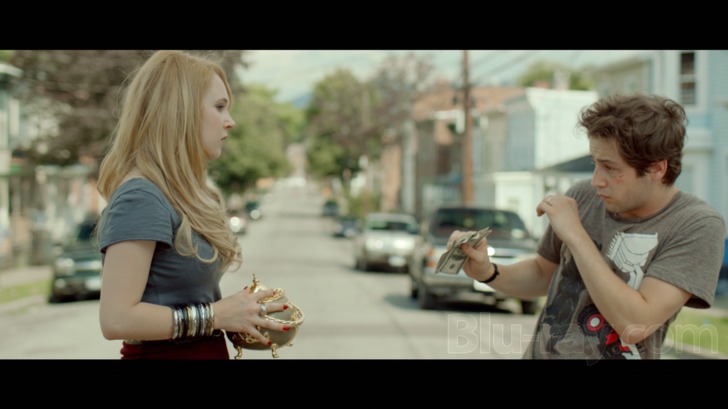
I don't know how well The Brass Teapot will age. It may be so much "of its time" that it loses its edge once we pass the Great Recession and move on to whatever lies beyond it. Then again, it may gain added resonance, as Alice and John come to be seen as emblems of a failed age when our economy attempted to support itself on pure consumption. Predicting how a film will play in ten years is an even more speculative enterprise than guessing what will succeed at the box office. At the moment, though, I find Temple and Angarano to be charming guides in charting the discontents of trying to buy one's way to happiness, and The Brass Teapot an amusing and occasionally brutal satire of the perils of doing so. As promised at the outset, I am not offering a recommendation, but the Blu-ray is a solid product if the film interests you.
Similar titles
Similar titles you might also like

Teaching Mrs. Tingle
1999

Killing Eve: Season 4
2022

Project X
#XtendedCut
2012

Dear Dictator
2018

Three O'Clock High
Collector's Edition
1987

Nerve
2016

Superbad
Unrated Extended Edition
2007

Cheap Thrills
2013

Get a Job
2016

The Skulls II
2002

The DUFF
2015

Struck by Lightning
2012

21 & Over
2013

Fist Fight
2017

Fired Up!
2009

Night School 4K
2018

Like Father Like Son
Retro VHS Collection
1987

Girls: The Complete First Season
2012

The Long Dumb Road
2018

Accepted
2006
